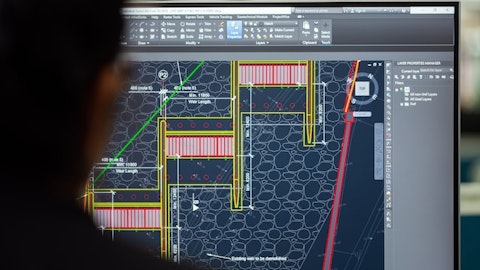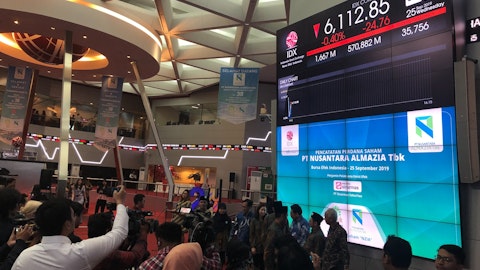Rich Schlenker: Yes. Thanks for that question, Josh. Look, I think we – the broad-based high hurdle, the reactive business that we have is 60% approximately of our business today. As Catherine mentioned, that grew in the high teens for the full year and that obviously has outsized growth. We’re very encouraged not only about that performance for last year because it clearly shows the demand for our services and what value we offer and all that. But we’re also encouraged about it for the long-term because it means this is really a growing area, and we’ve aligned our resources with the right issues, but we do expect that, that part of the business, yes, through some tightening of the belt but also just sort of against such a high hurdle that we had there will be relatively flat for the – over the next year.
And [Technical Difficulty] what’s playing in there. Where else do you find clients that are trying to reset their base as an overall organization. You have the automotive industry that is going through this challenge that Catherine mentioned, where maybe their aspirational goals around EVs are maybe being – are more tempered at this point in time. And they are trying to reset how their organization operates and focuses on a going-forward basis. But it doesn’t eliminate any of these disputes that come up. The perception or fact that people have claims are out there, and they are going to have to address them regardless of where they are financially or where some of these opportunities are going for them. So hopefully, that gives you a little more insight.
Josh Chan: Okay, that makes sense. Thanks, Rich. I guess as you guys talk with your customers, is it more of a broad-based cautiousness around spending in general? Does any conversations revolve around pricing and whether they will give you more business if the price was lower? Is anything like that at all?
Catherine Corrigan: Yes. So I’ll chime in here, Josh. Look, our clients – it’s not unusual at all in any environment for our clients to want to talk about price. But the feedback that we get is that it’s exactly strategically what we are looking for, which is we are reaching to Exponent for our most formidable challenges for the things that are the most difficult where we know that we need the A team. I mean you can always sell more at a higher price – at a lower price, excuse me, but it’s not necessarily about the chasing of volume, right? So strategically, when I talk with clients and get their feedback, we are not in a mode of, well, we just can’t use you guys anymore because you’re too expensive, right? It is no.
We incredibly value what we are doing with you and our partnership. We are absolutely going to continue to use you, who do you have coming up in your pipeline that is a rising star that we can look to as part of the next generation. This is a way that we are able to bring newer folks into those more lead roles. That’s been the development paradigm of Exponent over many, many decades. So, those conversations with our clients really do create those opportunities. And so I think that dynamic is very consistent with how it’s been, but they are facing uncertainty. And if they have an opportunity to wait a few months before they have to submit their brief or submit their expert reports, if that judge will let them take that delay, they are looking for those opportunities.
That is really where the rubber meets the road. And if they can come back to us and say, look, the expert report isn’t going to be due, we just got it pushed by six months. We want you guys to ease back maybe on your burn rate until then, then that’s – those are the kinds of things that we are dealing with.
Josh Chan: Okay. That’s really helpful color. Thank you, Catherine. I guess the last one from me. During the slower times like this, I guess is there an opportunity for you to generate new business that you currently don’t know about yet? And maybe could you take this opportunity to talk about how new business generation works at Exponent? Thank you.
Catherine Corrigan: Yes, absolutely, Josh. So, it’s a critically important focus that we have always, but even a sharpened focus now when we look towards what does that portfolio of service is going to look like next year or the year after or in 5 years or 10 years, right. So, it’s about engaging with our clients, it’s about having our teams sitting on industry standards committees. It’s about having them with their finger on the pulse at technical and scientific conferences. It’s about them being thought leaders who are up giving keynote addresses to those industry and technical conferences. These are the ways that we are able to ensure we are staying ahead of the curve with our market, positioning ourselves by developing people in these areas.
We have been anticipating our clients’ needs for decades. And what we are doing now in advanced driver assistance systems is a wonderful example. We invested in research. We saw the holes in the scientific data. 5 years to 7 years or 8 years ago, we made those investments. We did that testing. We published it. We took it on the road. And now that the litigation curve is in that particular area is accelerating. Our experts are the number one in the market for those particular areas. So, this is a constant focus for us. With the advent of artificial intelligence and the increase of that in terms of its presence in products, these are areas where artificial intelligence is asked to make decisions, and these are safety critical decisions and health critical decisions and we envision that there are going to be challenges with those decisions, and they are not always going to be right.
And so this client base is going to need the kinds of insights that Exponent brings, and we are focused on positioning ourselves to be the thought leaders in those areas.




